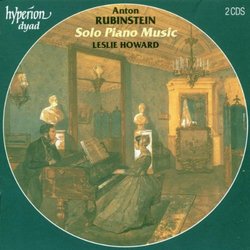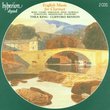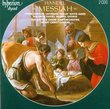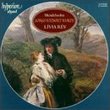| All Artists: Anton Rubinstein, Leslie Howard Title: Anton Rubinstein: Solo Piano Music Members Wishing: 0 Total Copies: 0 Label: Hyperion UK Release Date: 9/9/1997 Album Type: Import Genre: Classical Styles: Opera & Classical Vocal, Chamber Music, Forms & Genres, Fantasies, Short Forms, Historical Periods, Classical (c.1770-1830) Number of Discs: 2 SwapaCD Credits: 2 UPC: 034571120232 |
Search - Anton Rubinstein, Leslie Howard :: Anton Rubinstein: Solo Piano Music
 | Anton Rubinstein, Leslie Howard Anton Rubinstein: Solo Piano Music Genre: Classical
|
Larger Image |
CD DetailsSimilar CDs |
CD Reviews"Hercules of the Piano" Hexameron | 06/14/2007 (5 out of 5 stars) "Ludwig Rellstab, the famous music critic and poet, heard Anton Rubinstein play and called him the "Hercules of the piano." Rubinstein's powerful playing evoked all kinds of epithets like "Jupiter" and "Lion of the keyboard." But there was a time when his compositions were considered to be among the "greats" of his time. His Piano Concerti (especially No. 4), the "Ocean" Symphony, his opera "The Demon," and the ubiquitous "Melody in F" were highly esteemed. Thanks to Hyperion and Leslie Howard, though, Rubinstein's major piano works have emerged for the first time on recording. I implore the reader to check out Howard's other disc: Anton Rubinstein: Complete Piano Sonatas. The present recording, however, is a deleted issue from the Hyperion label; to my mind it's a rare artifact, a real "hidden treasure" of music. Although the two large-scale works featured here are the real reason for buying this recording, it behooves me to address Rubinstein's smaller pieces that separate the two gigantic works. Rubinstein's reputation as a miniaturist composer will dog him for the rest of his posthumous legacy. Like Liszt's Liebestraume No. 3, the "Melody in F" pops up everywhere as Rubinstein's famous piano piece. The Deux Melodies Op. 3 and Deux Morceaux Op. 30 would certainly substantiate Rubinstein's skill at writing accessible miniatures. These four pieces are charming and unique, and Howard's recording of Rubinstein's revised version of the "Melody in F" is remarkable. The Three Barcarolles show Rubinstein's peak of miniature writing and his Chopinesque grasp on melody and pianistic effect. In the Caprices of Op. 21 and the Serenades of Op. 22, Rubinstein demonstrates ability equal to that of Mendelssohn and even Schumann in the art of Romantic expression within the small framework of the miniature. Little do people know (I certainly didn't until Hyperion's release of the Piano Sonatas) that Rubinstein spent much time with the large-structure forms. Indeed, the two major works that deserve laurels and no less than five-stars for this entire two-disc set are the gargantuan Fantaisie in E minor Op. 77 and the Theme and Variations Op. 88. I say gargantuan because each one surpasses 42 minutes in length. The Fantaisie in E minor is structurally similar to his Piano Sonatas. But Rubinstein's originality and compositional talent reveals itself with each successive movement. At the conclusion of each movement, the next begins where the last left off, taking a motivic or rhythmic idea and using that as the basis for a new theme. "Fantaisie" indeed and this work is unbelievably grandiose and virtuosic, yet full of brooding darkness and pensive introspection. As for the Theme and Variations Op. 88, like Liszt's Sonata in B minor, the bland title betrays the majesty and breadth involved. I'm astonished at Rubinstein's compositional prowess and pianistic imagination. The theme is rather long (it reminds me of something from Alkan's Op. 76 Etude for the Left Hand), but Rubinstein's amazing Variations take it through every desired technical and emotional avenue. Howard even compares this work to Schumann's Etudes Symphoniques. No amount of words I can say would satisfactorily describe this magnificent work, but I must note the last Variation. Reaching 8 minutes in length, Rubinstein's last Variation becomes a heroic and virtuosic manifestation of contrapuntal writing. The profundity of Bach is attained and the orgasmic explosion of the conclusion belongs in the "Most Memorable Climaxes of Piano Music" category. Bottom line: Rubinstein's miniatures may not rival Chopin but they are as worthy as those of Mendelssohn, Tchaikovsky and even Schumann. My staunch five-star rating however goes to the two epic works that make up the body of both CD's. After each re-listening of Rubinstein's Fantaisie in E minor and the Theme and Variations, I'm actually irritated at the neglect Rubinstein has received. This recording may be unavailable but it's an invaluable treasure; I would recommend buying it used as soon as it's offered. Ultimately, one can only hope other pianists like Marc-Andre Hamelin will bring the Op. 77 and Op. 88 to light again." Worthwhile collection G.D. | Norway | 01/25/2009 (3 out of 5 stars) "Anton Rubinstein is a minor master who has managed to keep a toehold in the repertoire (certainly not only for his once-famous Melodie in F - included on this disc). His works often relies on simple, appealing melodies, often rather memorable, and while ones first reaction is often that the music is on the brink of banality, it somehow always manages to stay on the right side. There are few masterworks in his oeuvre (the powerful opera "The Demon" being an exception), but much that is very worthwhile, this double disc set from Leslie Howard and Hyperion bringing some examples of that (and some examples of the not-so-worthwhile) - even if there are few hidden gems here, the music is consistently well-crafted and interesting enough to hold your attention. Indeed, even more important than this set is the companion set with the sonatas, so if you do not know them I urge you to go there first.
The centerpieces are of course the two large-scale works. The huge Fantaisie in e minor is the most original work on the disc formally if not thematically, and probably the most memorable. It's metamorphosis-like structure is surely imaginative and well-handled by the composer, and never does it really outstay its welcome. The Theme and Variations is another ambitious work of no mean technical challenges, but it seems somewhat too ambitious for its material, and the impact it is apparently supposed to build up is lacking. Still, it is a piece that deserves to be heard. The smaller works are for the most part pleasant, charming and enjoyable, with the Morceaux op 30 and the barcarolles being perhaps the best of them. These are conservatively romantic and immediately appealing pieces, far from profound, but charming in a somewhat salon-like Chopin-reminiscent manner (but without the depth and invention of Chopin's music). Howard, known for his survey of Liszt's complete piano music, is surely up to the technical hurdles presented to him in the Fantasia and the Theme and Variations, but his approach is for all that maybe a little grey and lacking a little in nuanced shadings. The shorter pieces seem a little cold and lacklustre as well. Still, this is a worthwhile release, which you may consider acquiring after the sonatas (and if you are unfamiliar with Rubinstein's music, after the opera "The Demon" and the fourth piano concerto and second symphony as well)." |

 Track Listings (11) - Disc #1
Track Listings (11) - Disc #1



